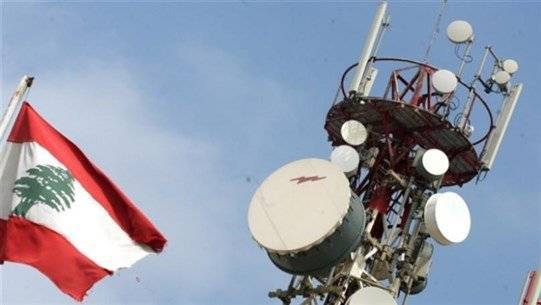The telecommunications sector in Lebanon hardly escapes one crisis before falling into another. After being threatened with total collapse months ago due to a lack of income in dollars while all operational expenses are in hard currency—leading to increased tariffs—and amidst a scarcity of fuel threatening to halt exchanges and services in regions, the strike by employees of the two cellular operators, "Alfa" and "Touch," which began yesterday (Thursday), poses a serious threat to paralyzing the sector.
Employees are demanding salary increases since they went from receiving their salaries in US dollars before the financial-economic crisis in 2019 to now getting paid based on an exchange rate of 8,000 LBP, which is the rate adopted for withdrawals at banks, knowing that the black market rate recently exceeded 34,000 LBP to one dollar.
All branches of "Alfa" and "Touch," as well as sales points at the companies' main centers and in regions, were closed yesterday, halting the sale of lines, recharge cards, and customer services. Maintenance work for the stations has also ceased due to the strike, which could create significant disruption in the market and threatens to stop telecommunications and internet services as a result of the halt in maintenance operations.
Communications Minister in the caretaker government, Johnny Al-Qarm, spoke about the "lack of professionalism" in addressing the strike by its leaders, noting that "the union leader for the employees and workers of companies operating in the cellular sector began to attack the administration and ministry, demanding salaries in fresh dollars through the media and in statements distributed before any negotiations with us regarding this matter." Al-Qarm emphasized in a statement to "Asharq Al-Awsat" that his priorities remain his commitments to subscribers "who expect from us to improve service after increasing tariffs, so we hold weekly meetings to devise a detailed work plan to embark on this path after successfully preventing the sector's collapse and ensuring its continuity."
Al-Qarm explained: "We had proposed that 10% of salaries for employees in the two companies be provided in fresh dollars in the first month if we achieve the first goal of the plan set to revitalize the sector, with an increase of 5% in the second month and another 5% in the third month, provided the desired objectives are achieved, thus securing 20% of the salary in dollars. However, we were surprised by their demand for this percentage from the first month, regardless of achieving the goals we set." Al-Qarm mentioned that "public opinion should be informed about what is happening to know who is obstructing the revitalization of the sector and paralyzing it, and who is working on its continuity and improving services."
The Lebanese government approved increasing communication tariffs in May, resulting in a fivefold increase in cellular service rates, while the prices for landlines doubled. The government, along with the Ministry of Communications at that time, attributed the decision to raise tariffs to counter the sector's collapse, considering that most of its expenses are in fresh dollars (money that entered Lebanon after 2019, which recently exceeded 34,000 LBP in the parallel market), while its revenues were still based on the official exchange rate of 1,500 LBP to one dollar. Consequently, employees of the cellular companies expected their salaries to rise alongside the tariff increase and began negotiations with those responsible for the companies and the Ministry of Communications. However, discussions reached an impasse, leading to the announcement of the strike.
Mark Aoun, union leader of the employees and workers of the companies operating in the cellular sector, noted that "after both companies began to charge the actual value for the services and products they offer, we expect employees to receive their salaries at their actual value. Therefore, we initiated negotiations with the relevant parties, as the last thing we wanted was to reach a strike under such circumstances and during the tourist season." He stated to "Asharq Al-Awsat": "We tried our utmost to avoid reaching a strike, reducing the numbers we were demanding to minimal thresholds, but there was no response with them continuing to act with arrogance."
Aoun pointed out that "most companies, for about two years now, have been providing amounts of fresh dollars to their employees ranging from 10% to 50%. However, employees of the two cellular companies have not, until today, received any amounts in fresh dollars, and they are unable to withdraw their entire salaries from banks that set low withdrawal ceilings." He added: "We know that the strike is harmful to the country; it is harmful to us and to our families and friends as it means that telecommunications and the internet will be affected, and there will be no possibility to purchase lines or recharge cards, halting customer service. However, we are forced to take this step to secure our rights in the face of the officials' and minister's disregard for our demands."
It was notable that the meeting held yesterday between the caretaker Minister of Communications Johnny Al-Qarm and the officials from "Alfa" and "Touch" companies did not address the employees' strike. A statement issued by them indicated that the meeting was to follow up on the procedures and steps adopted for the workflow and the solution plan to enhance service quality and ensure the continuity of the sector. The meeting addressed the quality service indicators and the signal level to achieve a 95% coverage ratio across Lebanese territory within the next three months, a percentage that was achieved on the day of the parliamentary elections and was achieved in 2018 as well. It also discussed the consumption rate and the number of subscribers. The statement noted an increase in the number of subscribers by 1% at "Touch" and a sixfold increase in the company's revenue compared to the 5.2% that was initially expected. The discussion also included technical problems facing the networks that negatively impact transmission and internet and communication services, and Al-Qarm directed that any issues be resolved to ensure service for citizens.




